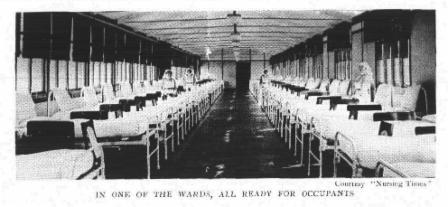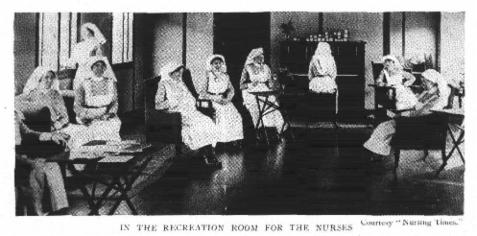Ontario Military Hospital, Orpington
*****
THE ONTARIO MODEL HOSPITAL AT ORPINGTON
by GERTRUDE E. M. VAUGHAN
The World’s Work Magazine, July 1916
by GERTRUDE E. M. VAUGHAN
The World’s Work Magazine, July 1916
*****


‘BUFF ORPINGTONS!’ The name comes easily to the tip of the tongue when one thinks of the peaceful little Kent village among the fields and hop gardens of the Weald. But it is not only for the famous breed of chickens that the village will be remembered in years to come. For it is here that citizens of Ontario have established a unique hospital, provided for out of the assessment of one mill (one-tenth of a cent) on every citizen in the Province. And, since all the men on the staff are in khaki, one may be forgiven the thought, for buff is not so very different a hue, and they are most certainly ‘Orpingtons!’ Everywhere one meets them, swinging along at an easy stride or dashing past in cars or going more slowly in the ambulances which are part of the munificent equipment sent over to the Mother Country by her sons and daughters on ‘the other side.’
The particular ‘Buff Orpington’ who guided me in my tour of the hospital was Captain Fox the Quartermaster, a typical Canadian, quiet and resourceful; a man much in request, for on our round we were frequently interrupted by various people wanting things, from the Home Sister asking for more table napkins for the Sisters’ Mess to the orderly who wanted to know where he was to ‘strip’ and get into his football rig. To the postman who was receiving instructions for his rounds to collect the letters from the huts (the entire hospital is in huts) the Quartermaster gave an order to buy a bicycle as naturally as one might speak of buying a collar-stud or a penny stamp.
The mere fact that the curtains for the hundreds of windows cost something like £1,500 indicates the scale on which they do things at Orpington. There must be miles of linoleum, and one might almost say that a small forest went into the making of the wooden portions of the huts themselves. With hardly an exception the whole of the outfit has been sent over from Ontario, and we passed on our rounds bales upon bales – all coming direct or through the Canadian Red Cross in London – of comforts, as well as medical and surgical necessaries for the patients. These, by the way, will not be only Canadians, for the War Office has been most emphatic that men belonging to any of the Allied Forces are to have the benefit of the hospital.
I suppose that to most people the wards represent the principal part of a hospital, but this particular one is evidently going to be so nearly self-contained and self-supporting that it took quite a long time to visit all the huts. I saw stores supplied on a most generous scale – stores of meat; tons of groceries (Captain Fox alluded lightly to the fact that he had bought up vast quantities of sugar, and I wondered whether that accounted for the trouble some of my friends had getting it!); dry goods of all kinds; provisions in the shape of sides of bacon, hams, and so forth, not to speak of bedding, hot bottles by the hundred (the Canadians feel our damp cold very much), and clothing. I learnt that every man on leaving will be presented with a complete outfit, down to his shaving-brush. So that it was quite a long time before we arrived at the wards.
There are as yet no farms for wheat growing or the rearing of ‘beasts’ to keep the community of some 200 persons in addition to the patients in bread and meat, but everything points to expansion, and there is still a goodly proportion of the sixty acres of the estate available. Part of it will be used for building a convalescent department for those patients who are ready to benefit by change of air from the hospital proper to another a few hundred yards away, but even that will leave a good deal of vacant land leased for the duration of the war by the Ontario Government. When I suggested that with the addition of a farm and a vegetable garden, the hospital would be able to stand a lengthy siege, Captain Fox smiled enigmatically. It goes without saying that the hospital makes its own electric light and power. The Power-house is the Quartermaster’s special hobby, and the special point about the Power-house is that it has an emergency plant for use in case of need.
The huts are built of asbestos and are as nearly fire-proof as possible. All are painted green in the interior, and the effect of this, with the brown woodwork, is particularly pleasing and restful. Provision has been made for the full strength of a Military Hospital, namely 1,040 beds, in twenty wards of fifty beds each and smaller private wards for very acute cases. Beds, lockers – everything – have come from Ontario. ‘Everything’ includes also the staff. “Unless you are a good citizen of Ontario,” said Captain Fox, “you can’t get a job on this place.” Col. McPherson, the Commanding Officer, has amply won his title by a year’s service at the Front. Captain Fox has done the same, indeed these two seem to have ‘hunted in couples’ since the war began.
Citizen Nurses
Since women have the provincial vote in Ontario, the nurses also rank as ‘good citizens.’ Moreover, the Matron and Assistant Matron have also done a year’s work or more in France, having come over soon after war began to help the Mother Country in her hour of need. All the nurses are what is known in Canada and America as ‘Graduates,’ that is, they are fully-trained. They are also registered, since State Registration is in force, and may write ‘R.N.’ after their names. Their navy-blue outdoor uniform with brass buttons and shoulder stars has become quite a familiar sight in the London streets since the war began, hundreds having by now come over to nurse the wounded in this country and abroad. The nurses have military rank – the Matron is a Captain, and the Sisters are Lieutenants. Miss Margaret Smith, the Matron, is a woman of experience in hospitals of the United States and Canada, and comes from Ottawa. She was trained some twenty years ago in the Philadelphia Hospital. For the last year she has worked more or less under canvas in France, and I believe there are moments when she would gladly exchange the comfort of Orpington for the ‘roughing-it’ tent-life she led there! The Assistant Matron, Miss Mattice, was with Miss Smith in France, both having come over in the first contingent. There are eighty-one nurses. Those who had just arrived when I visited the hospital had had a most exciting crossing from America on one of the fastest boats, and had arrived at Orpington in the dead of night. However, they had recovered from their fatigue and were buzzing with talk and laughter, and evidently in the very best of spirits.

Specialists from Ontario
An appointment of interest to women is that of ‘Dietician.’ It is hardly if at all known in this country, though ordinary enough in Canada and America. The Dietician’s duties include the oversight of the preparation of all the food from a scientific point of view, and the lady who holds this important post at Orpington is a University woman, Miss McAdams, who has made this her special study and who has held important posts of a similar kind at girls’ schools in Alberta and elsewhere.
There are thirty-six medical men, many of them Ontario’s best. “We are robbing our Universities of our best men,” Captain Fox remarked. There are specialists for every department – eye, ear, throat, dental, mental – in addition to the physicians and surgeons. In one of the wards I saw one of the special shower-baths used in the most advanced mental hospitals, with a most elaborate system of pipes and sprays. Mental cases are, alas, of common occurrence, as the result of shock, among our men at the Front. And they are to have the benefit of all that science can do for them. The dispensary employs about half a dozen chemists.
Before leaving the staff I may mention that the Quartermaster gained much of his experience in catering and organising for large numbers of people at Toronto University, where he was Assistant Superintendent. The administrative side of the work at any large military hospital is of course very elaborate, and the clerical work alone employs a number of persons. In British military hospitals a great deal of this is now done by women, and this will be increasingly so as more and more men have to join the ranks. At Orpington, however, there did not appear to be any women clerks. Perhaps that is to come. The Army Service authorities require a most detailed account of everything, and I was show sheets filled with the most tiresome-looking figures. “We note,” the A.S.C. will write, “that there is no entry relating to pepper,’ and I do not say that a special commission has to sit forthwith to investigate the pepper question, but somebody has to account for the omission.
Recreation is by no means neglected, and as it was a Saturday afternoon several of the officers were practising baseball, while the orderlies, as before indicated, were off to the football field, football being a very popular game with them. So is cricket; and indoors, no recreation room seemed complete without its billiard table. There is also a large entertainment hall with a stage which admits of four changes of scene, which, with an adjacent canteen, will assuredly be very popular.
A Friendly Spirit
The friendly spirit of everyone is very pleasant to the visitor. It extends even to some of the notices on the doors, one of which read, instead of ‘No admittance except on business,’ as follows: ‘Keep out! This means you.’ Hospitals, like regiments, must have their mascot, and the Orpington mascots are three, gifts of Mr. Cook, famous all the world over for his poultry farm. These are beautiful prize birds, and they live in a special little house in the grounds, where they preserve a lofty and detached demeanour as befits fowls of long and unblemished pedigree.
There was a most savoury smell from the kitchens – where the bread is baked by steam, in forty-four large ovens on rails – and I confess that I was not sorry when Captain Fox translated a certain bugle-call as “Come to the cook-house door!’ Everyone came trooping in, the men to their mess and the women to theirs, to a welcome lunch, excellently cooked and served. There were no patients when I visited the hospital, and the report that it was ready had only just been sent up to the War Office. I am quite sure that, if only it were not too good to be true, there is nothing the kind people of Ontario would like better than that the wards should remain empty to the end of time. They feel the war very keenly, and the terrible suffering it entails. They are showing their sympathy in a truly munificent way, and we may well be proud that the Dominion, and in this case one Province, has come to the old country’s help without stint. If only there were no need for any more hospitals! But the end is not yet.
*****